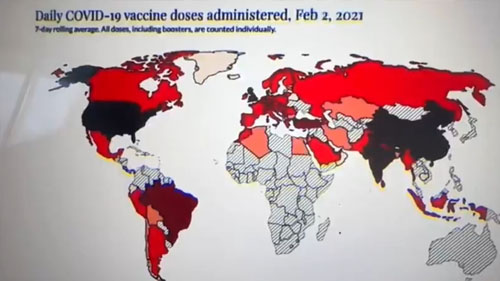| Recent Featured Videos and Articles | Eastern “Orthodoxy” Refuted | How To Avoid Sin | The Antichrist Identified! | What Fake Christians Get Wrong About Ephesians | Why So Many Can't Believe | “Magicians” Prove A Spiritual World Exists | Amazing Evidence For God | News Links |
| Vatican II “Catholic” Church Exposed | Steps To Convert | Outside The Church There Is No Salvation | E-Exchanges | The Holy Rosary | Padre Pio | Traditional Catholic Issues And Groups | Help Save Souls: Donate |  |









 " />
" /> " />
" /> " />
" /> " />
" /> " />
" />




"Prepping for a cyber pandemic: Cyber Polygon 2021 to stage supply chain attack simulation"
"The World Economic Forum (WEF) will stage another cyber attack exercise as it continues to prep for a potential cyber pandemic that founder Klaus Schwab says will be worse than the current global crisis.
The SolarWinds hack served as a wake-up call to the supply chain attack vulnerabilities still present in public and private organizations, and it served as a warning that the next breach could be exponentially worse in spreading through any device connected to the internet.
Following up on last year’s Cyber Polygon cyber attack exercise and event aimed at preventing a digital pandemic, the WEF has announced that the 2021 edition will be taking place on July 9.
This year, Cyber Polygon 2021 will simulate a fictional cyber attack with participants from dozens of countries responding to 'a targeted supply chain attack on a corporate ecosystem in real time.'
According to the WEF, COVID-19 was known as an anticipated risk, and so is its digital equivalent.
What’s more, 'A cyber attack with COVID-like characteristics would spread faster and farther than any biological virus. Its reproductive rate would be around 10 times greater than what we’ve experienced with the coronavirus.'
In his welcoming remarks at Cyber Polygon 2020, WEF Founder Klaus Schwab warned about a coming 'cyber pandemic' that would be worse than the current global crisis.
'We all know, but still pay insufficient attention to, the frightening scenario of a comprehensive cyber attack, which would bring a complete halt to the power supply, transportation, hospital services, our society as a whole,' he said.
'The COVID-19 crisis would be seen in this respect as a small disturbance in comparison to a major cyber attack.'
Schwab added, 'It is important to use the COVID-19 crisis as a timely opportunity to reflect on the lessons of cybersecurity community to draw and improve our unpreparedness for a potential cyber pandemic.'
As the digital world encroaches on our physical and biological worlds, an effective cyber attack could compromise anything connected to the internet, including:
Medical devices that keep people alive
The Internet of Things (IoT) ecosystem of connected devices that run smart homes (i.e. cameras, microphones, sensors, etc.)
The Internet of Bodies (IoB) ecosystem of digitally-connected humans
Global financial systems
Energy grids
Water treatment facilities
Government IT systems
Military and defense infrastructure
And more
Currently, 'The only way to stop the exponential propagation of a COVID-like cyber attack threat,' according to the WEF, 'is to fully disconnect the millions of vulnerable devices from one another and from the internet.'
But, 'A single day without the internet would cost our economies more than $50 billion, and that’s before considering economic and societal damages should these devices be linked to essential services, such as transports or healthcare.'
Needless to say, a cyber pandemic would wreak havoc on nearly all aspects of society... and the solutions recommended for a cyber pandemic could be far more detrimental to individual liberty than the cyber attack itself.
The central theme of the Cyber Polygon 2020 exercise was 'digital pandemic: how to prevent a crisis and to reinforce cybersecurity on all levels.'...
Speaking at Cyber Polygon 2020, former British Prime Minister Tony Blair stated with confidence that governments are 'absolutely, inevitably' moving in the direction of digital identity adoption...
Digital identity is a major component of the WEF’s great reset agenda as it relates to transformative technologies powering the Fourth Industrial Revolution.
A digital identity keeps a record of everything you do online, including what you share on social media, the websites you visit, and your smartphone’s geolocation, and it can house all of the credentials you would normally find in a physical wallet, such as your driver’s license, insurance card, and credit cards.
In his talk, Blair didn’t make the case for why having a digital identity was actually necessary to prevent a cyber pandemic, but rather that digital identities would be an inevitable part of the digital ecosystem, and so governments should work with technology companies to protect and regulate their use.
'Digital ID for me is a very big part of the future,' said Blair.
'Inevitably, governments are going to move in this direction — absolutely, inevitably,' he added.
'And so what I think’s most important is that we from the political side wake-up to the potential of technology and engage with the changemakers inventing the technology, so that we understand it and can regulate it sensibly and not stupidly.'...
And while digital identities show promise towards improving the livelihoods of millions when governed ethically, they are also used by authoritarian governments to profile and police citizen behavior under a social credit system.
Whether the data be secured or not, individual liberty will depend on how the technology is used and the level of trust given to those who govern it.
According to a WEF report from 2018, 'digital identity determines what products, services and information we can access – or, conversely, what is closed off to us' — the level of which to be determined by our online behavior...
Cyber Polygon 2020 dedicated one of its live streams sessions to the concept of 'fake news' as being a deadly, digital pandemic plaguing 2020...
Cyber Polygon 2020 didn’t issue any concrete recommendations with regards to dealing with fake news; however, the WEF-led Event 201 coronavirus pandemic simulation did recommend that, 'Governments will need to partner with traditional and social media companies to research and develop nimble approaches to countering misinformation.'...
During the Polygon 2020 live session, WEF Chief Business Officer Jeremy Jurgens said that preventing the next crisis will require that all sectors of society and the economy come together.
'I believe that there will be another crisis,' he said. 'It will be more significant. We need to actually start preparing for that now.'...
For example, many scenarios played out in the WEF-backed fictional pandemic simulations Clade X (May, 2018) and Event 201 (October, 2019) later came to pass, along with several policy recommendations for dealing with the COVID-19 pandemic.
These scenarios depicted:
Governments implementing lockdowns worldwide
The collapse of many industries
Growing mistrust between governments and citizens
A greater adoption of biometric surveillance technologies
Social media censorship in the name of combating misinformation
The desire to flood communication channels with 'authoritative' sources
Mass unemployment
Rioting in the streets
And a whole lot more!
When the World Health Organization (WHO) declared the coronavirus a pandemic on March 11, 2020, governments all over the world went into lockdown, which had devastating effects on the economy with businesses closing, civil unrest skyrocketing, unemployment surging, housing foreclosures on the horizon, and the largest transfer of wealth ever recorded in human history.
However, many of these scenarios were already anticipated and taken into account in previous simulations, and yet they all still came to pass.
Will the conversations coming out of Cyber Polygon 2021 prove to be as prophetic for the digital world as Event 201 and Clade X were for the physical one?"
Sign up for our free e-mail list to see future vaticancatholic.com videos and articles.
Recent Content
^